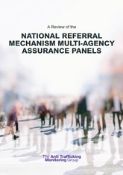Anti-Trafficking Monitoring Group

About the Anti-Trafficking Monitoring Group
Anti-Slavery International hosts and chairs the Anti-Trafficking Monitoring Group (ATMG), a coalition established in 2009 to monitor the UK’s implementation of European anti-trafficking legislation. The group examines all types of human trafficking, including internal trafficking and the trafficking of British nationals.
ATMG operates according to a human rights-based approach to protect the well-being and best interests of victims of human trafficking. It comprises seventeen leading UK-based anti-trafficking organisations: Anti-Slavery International, Ashiana Sheffield, Bawso, ECPAT UK, Focus on Labour Exploitation (FLEX), Helen Bamber Foundation, Kalayaan, Law Centre (NI), the Snowdrop Project, the TARA service, JustRight Scotland, UNICEF UK, the Children’s Law Centre, Flourish Northern Ireland, the East European Resource Centre, the Scottish Refugee Council and Hope for Justice. It also works closely with the Human Trafficking Foundation.
ATMG plays a crucial part in our advocacy to improve the anti-slavery response of the UK Government.
ATMG’s work
The group has published reports and briefing papers on human trafficking in the UK, focusing on the three ‘Ps’; prevention, protection and prosecution. The research findings form the basis of the coalition’s advocacy for improvements in the UK’s response to trafficking and other forms of modern slavery.
In 2019, the coalition marks its ten years’ anniversary. To mark the occasion and take stock of its efforts to hold the UK Government to account, it published a report Real people, real lives. 10 years of advocacy for victims of slavery in the UK.
The key successes of the Anti-Trafficking Monitoring Group include:
- Influencing the UK Government’s decision to sign the Council of Europe Action against Trafficking in Human Beings in 2009. This led to the provision of a legal basis for policies and the initiation of the National Referral Mechanism (NRM) – the UK’s primary support system for identified victims of slavery.
- Since its initiation the coalition has successfully advocated for the provisions within the mechanism to be improved and to be more victim-centred.
- The ATMG was instrumental in identifying the human rights violations and failures in identification of victims, associated with treating victims as immigration problems first and victims second.
- The ATMG was instrumental in the shaping of the Modern Slavery Act, including introduction of Independent Child Trafficking Guardians (ICTG), measures to protect victims from being prosecuted and the introduction of an Independent Anti-Slavery Commissioner.
- A reversal of the Home Office decision to cut the rate of subsistence support provided to over 1,000 victims of trafficking. The cuts to subsistence rates had made it extremely difficult for victims to rebuild their lives, making them more vulnerable to re-trafficking.
- The ATMG provided evidence to the court case that forced the Government to drop the 45 days limit for providing support for survivors and obliged it to design a system providing them long term support fulfilling their individual needs.
Read the full ATMG briefing for the House of Lords on the “Illegal Migration” Bill here.
Read the full ATMG briefing on the “Illegal Migration” Bill here, and the Executive Summary here.
Read the ATMG written evidence submission for the Modern Slavery Strategy Review here.
Recommendations for strengthening measures on victim support through the Modern Slavery Bill

The Queen’s Speech 2022 announced the introduction of a Modern Slavery Bill in order to “strengthen the protection and support for victims of human trafficking and modern slavery and increase the accountability of companies and other organisations to drive out modern slavery from their supply chains”.
22 organisations have put together five key recommendations to support the Bill in its stated aim to strengthen the protection and support for victims of human trafficking and modern slavery.
Read the recommendations here
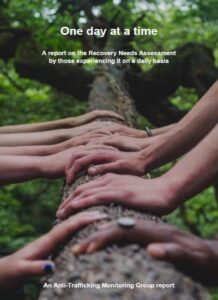 “One day at a time” is the first report looking at the experience of the Recovery Needs Assessment (RNA) process. This report charters the first-hand experiences of, not only those on the receiving end of support, but also the experiences of Modern Slavery Victim Care Contract (MSVCC) support providers, along with, support workers outside of the MSVCC.
“One day at a time” is the first report looking at the experience of the Recovery Needs Assessment (RNA) process. This report charters the first-hand experiences of, not only those on the receiving end of support, but also the experiences of Modern Slavery Victim Care Contract (MSVCC) support providers, along with, support workers outside of the MSVCC.
Download a copy of the full report here.
Also available: executive summary and overview
 Briefing on Clause 59 of the Nationality and Borders Bill, laying out the argument against raising the threshold of receiving an positive Reasonable Grounds decision in the National Referral Mechanism.
Briefing on Clause 59 of the Nationality and Borders Bill, laying out the argument against raising the threshold of receiving an positive Reasonable Grounds decision in the National Referral Mechanism.
View the full briefing here
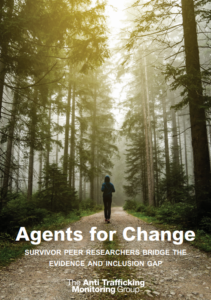 Agents for Change is a briefing that shares reflections on the lessons and challenges of a small research team originally formed to conduct research on long-term outcomes for survivors of slavery in the UK in 2020. The team consisted of three women with lived experience of modern slavery and the Anti-Trafficking Monitoring Group (ATMG). Co-written by survivors and non-survivors of slavery or exploitation, this briefing shares collective and individual reflections on the process of working and learning together to date.
Agents for Change is a briefing that shares reflections on the lessons and challenges of a small research team originally formed to conduct research on long-term outcomes for survivors of slavery in the UK in 2020. The team consisted of three women with lived experience of modern slavery and the Anti-Trafficking Monitoring Group (ATMG). Co-written by survivors and non-survivors of slavery or exploitation, this briefing shares collective and individual reflections on the process of working and learning together to date.
Download PDF: Agents for Change
Watch and listen to the Podcast series on Youtube:
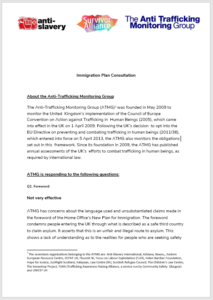 Together with Survivor Alliance, The Anti-Trafficking Monitoring Group (ATMG) has published its response to The New Immigration Plan. Together, both groups set out why the Government’s New Plan for Immigration will leave people more vulnerable to exploitation. We also discuss how the New Plan for Immigration has not benefited from the wealth of lived experience. People with lived experience of course understand the operational details of how these systems play out in practice and are best placed to test and explain what does and what does not work.
Together with Survivor Alliance, The Anti-Trafficking Monitoring Group (ATMG) has published its response to The New Immigration Plan. Together, both groups set out why the Government’s New Plan for Immigration will leave people more vulnerable to exploitation. We also discuss how the New Plan for Immigration has not benefited from the wealth of lived experience. People with lived experience of course understand the operational details of how these systems play out in practice and are best placed to test and explain what does and what does not work.
Download PDF: Immigration Plan Consultation
This briefing reviews the provisions of the recently established Multi-Agency Assurance Panels (MAAPs) to date, assessing the extent to which they contribute to robust and transparent decision-making in the NRM.
Download PDF: A review of the National Referral Mechanism Multi-Agency Assurance Panels
Downl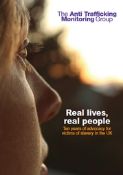 oad in PDF format: Real people, real lives: Ten years of advocacy for victims of slavery in the UK.
oad in PDF format: Real people, real lives: Ten years of advocacy for victims of slavery in the UK.
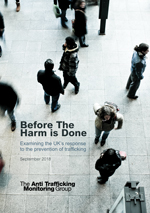 The latest research report entitled ‘Before the Harm is Done’ analyses action taken in the UK since 2012, relating to the prevention of human trafficking. The report assesses the extent to which it contributes to the UK’s implementation of the 2005 Council of Europe Trafficking Convention and the EU Trafficking Directive requirements.
The latest research report entitled ‘Before the Harm is Done’ analyses action taken in the UK since 2012, relating to the prevention of human trafficking. The report assesses the extent to which it contributes to the UK’s implementation of the 2005 Council of Europe Trafficking Convention and the EU Trafficking Directive requirements.
Download the report in a PDF format: Before the Harm is Done
- Call for evidence: recovery needs for victims of modern slavery (7th August 2020)
- Letter to the Home Office on the Recovery Needs Assessment (RNA) guidance (4th November 2019)
- Access all reports by the Anti-Trafficking Monitoring Group
Members of the Anti-Trafficking Monitoring Group
- Anti-Slavery International
- Ashiana Sheffield
- Bawso
- Children’s Law Centre
- Eastern European Resource Centre (EERC)
- ECPAT UK
- Flourish Northern Ireland
- Focus on Labour Exploitation (FLEX)
- Helen Bamber Foundation
- Hope for Justice
- JustRight Scotland
- Kalayaan
- Law Centre NI
- Scottish Refugee Council
- The Snowdrop Project
- The TARA service
- UNICEF UK
